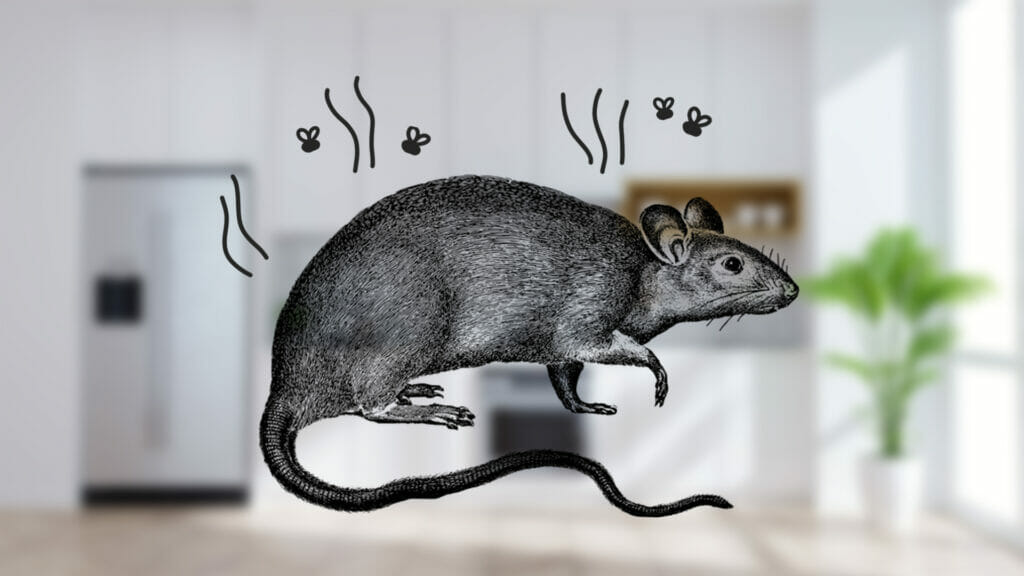Table of Contents
Have you noticed a terrible smell in your home that you just can’t identify? Unfortunately, this scent may well be caused by a dead rat somewhere in your home!
But, fear not; you’re in the right place! Integrum are trained pest control experts who know this smell all too well. Fortunately, this means we also know how to deal with it.
This odour is often caused by untrained pest controllers attempting to use rat poison to control an infestation. If the poison isn’t placed in the correct areas, the rats will consume it and later die in unknown locations around your home – resulting in the awful smell.
We’ve created this guide for the smell caused by dead rats, including how to identify the source, advice on removing dead rats from your home, and our top tips for getting rid of the odour.

How to Identify the Smell of a Dead Rat?
A foul smell in your home could be several things – blocked drains, a dirty fridge, or dirty carpets. However, the scent of a dead rat is easily distinguishable.
Here’s a list of things to look out for:
- The smell starts suddenly and randomly and has never happened before in your home.
- A decaying smell that will get worse over time as the body decomposes.
- The smell of rotting food – often described as rotting cabbage!
- While it may be rather faint to start with, the smell will become unbearable and extremely intense as time goes on.
The foul smell is produced as the body of the rat begins to decompose. This natural process involves the production of toxic gases, including methane, hydrogen sulphide, and ammonia.
When combined, these gases create a smell you’ll never forget.
It is also worth mentioning that this decaying smell isn’t only attributed to rats. This smell could be caused by other rodents including mice, or squirrels.
How Long Does the Smell Last?
There’s no definitive answer to this question, as the amount of time the smell lasts is dependant on the time it takes for the animal to decay. The time taken to decay is then also dependant on several factors, including:
- Size of the rat
- Temperature
- Humidity
On average, a rat takes roughly 2-3 weeks to decompose; however, lower temperatures will increase this time period significantly.
Once the body has decomposed, the smell won’t instantly leave your home. Instead, the foul smell will still be lingering in your home roughly two weeks later.
This means that, on average, your home could be filled with this awful stench for around five weeks!
How to Remove a Deceased Rat From Your Home?
Nobody wants their home to smell for five weeks straight, so how can you get rid of the problem?
In order to remove the smell, you must first remove the cause of the smell – the dead rat.
Finding the Location of a Rat in Your Home
Before you remove the deceased rat from your home, you need to identify precisely where it is, and this can be a difficult task to complete.
Rats are primarily nocturnal creatures who will avoid contact with humans as much as possible – meaning they often frequent quiet, hidden areas of the home.
You can try to identify the source by inspecting such areas of your home, including the loft, cupboards (particularly kitchen cupboards), and holes around pipework, anywhere that provides shelter and is close to a source of food.
However, the best and often the easiest way to identify the rat’s position is to use your nose! We know it’s not an enjoyable task, but the pungent odour released by the decaying rat may just be your best bet for locating it.
- Identify the room in which the smell is most pungent.
- Follow your nose and try to narrow down the rat’s location within this room. It may be helpful to get down onto the floor and look for holes in your skirting boards.
- Try to narrow it down to the smallest area possible.
- If you can’t physically see the rat within this area, then the rat may be in your walls, under your floor or hidden in a hard to reach place.
How to Get Rid of a Dead Rat?
Once you’ve identified the location of the carcass, you must get rid of it immediately.
If the rat is out in the open and easily accessible, you should be able to remove it yourself using these steps:
- Before you go near the rat, equip yourself with PPE – we suggest disposable gloves and a mask to cover your mouth and nose at the bare minimum. Rats are carriers of disease, and touching one without taking any precautions will put both you and your family at risk of contracting a life-threatening illness.
- Use a sealable bag to contain the rat’s body; either pick it up using a tool or the bag itself.
- Throw the bag away, making sure it’s sealed beforehand. It may also be worth checking what you can and can’t dispose of in your bins with your local council.
- Clear the area of any debris left behind by the rat, especially droppings and urine.
- Disinfect the entire area using bleach and water or antibacterial sprays. You may need to clean more than once to ensure the site is clean.
- Throw away everything used in this process – your gloves, mask, any cleaning equipment you used etc.
- Wash your hands thoroughly, or even take a hot shower to ensure you’re safe from the bacteria.
Unfortunately, if the rat body is not out in the open or easy to reach, the previously mentioned steps won’t cut it.
This is often caused by untrained individuals using poisons to control a rat infestation. In addition, the poisons commercially available to the public are much weaker than professional poisons and take longer to kick in.
Rats may live roughly 2-3 days with this poison in their systems, meaning they could be anywhere by the time you can smell them. If you can smell a decaying rat and either just can’t identify the location or simply can’t reach it to remove it, then call a pest control professional, like Integrum, who offer London rat control services.
How to Get Rid of the Smell of Dead Rats?
Once you’ve successfully removed the rat carcass and any debris, you can begin to work on the stench that’s been plaguing your home.
We’ve put together a list of our top tips for clearing your home of the dead rat smell:
- Ventilation – Get those windows open! No matter the weather, the only way you’ll get anywhere is first to ventilate the area, replacing the putrid air with clean, fresh air.
- Clean – Not only should you clean your surfaces to prevent any contamination, but fabrics and soft furnishings can retain odours for weeks – further prolonging your pain. Wash all materials that were close to the site of the rat to freshen up the area.
- Air Purifier – If you have access to an air purifier, then now’s the time to use it! By working in a similar but more effective way to opening the windows, purifiers will replace the contaminated air particles with cleaner air, thereby eradicating the smell.
- Air Fresheners – While they won’t solve all your problems, air fresheners are ideal for providing instant, but temporary, relief from the foul odours in your home. Spray your favourite scent around the room, light a candle or an incense stick, or perhaps try an odour eliminator.
Once you’ve removed the body, the smell should leave altogether after a few weeks, depending on the severity of the infestation. Make sure you proof the area you found the rat in to ensure the cycle doesn’t repeat itself all over again.
How to Prevent Your Home From Smelling Like Decaying Rats?
The best way to prevent this from happening is to avoid using DIY methods and rat poisons unless you’re trained to do so!
Yes, sometimes the DIY methods work, but nine times out of ten, they don’t, and is it worth risking your family’s health by attempting to solve the problem single-handedly? We don’t think so.
If you think your house may be home to a rat infestation, then take a look at our guide on how to get rid of rats, in which we cover signs of rats, how to identify rats and methods for controlling preventing them at home.
Rats can bite and spread diseases, making them dangerous pests. If you’ve seen signs of rats or sensed a foul odour in your home, you should act immediately and call a pest control expert.
Integrum offers professional rat removal and proofing services across the South East of England, including the whole of London.




